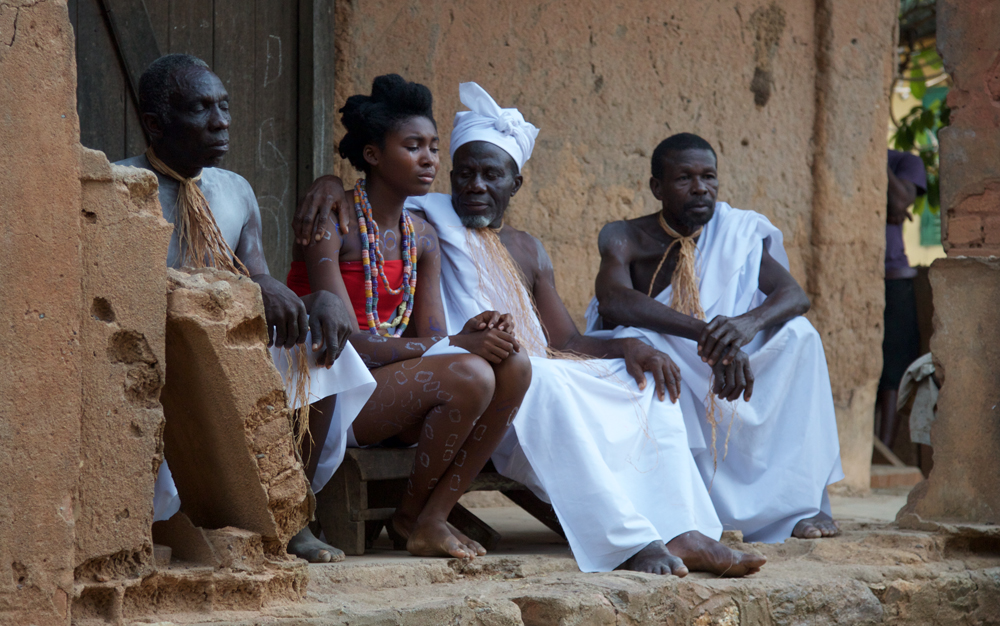It was a funeral of a close friend’s father when Leila Djansi began thinking about her latest film, “Like Cotton Twines.” In honor of the voodoo priest who recently passed, a group of Trokosis attended the ceremony in Ghana, religious slaves by tradition, though you’d hardly know it from their emphatic chants on the day, raising their voices in unison to say “We are queens not slaves.” Their defiance resonated with the writer/director, who had been making movies in America for the past few years, reminding her of her first encounter with a Trokosi at the age of 10, yet a very different one, seeing the defeat in her eyes as she walked through a Ghanaian market with her mother.
Djansi still returns to Ghana as often as she can to see her mom, as well as “of course, to eat some Ghanaian food, of course,” but after developing her skills as a filmmaker in America, she saw an opportunity to make sense of the conflicting experiences of the proud women she saw with what she knew to be their ongoing plight in “Like Cotton Twines,” which recently premiered at the Los Angeles Film Festival. The eye-opening drama tells of a bright young 14-year-old named Tuigi (Ophelia Klenam Dzidzornu), robbed of her independence at birth and then in a particularly brutal moment, the joy of womanhood, yet comes into contact with Micah (Jay Ellis), an American teacher who travels to Ghana as part of a two-year program, who aims to buy her freedom. However, things don’t go according to plan and while “Like Cotton Twines” follows Tuigi’s harrowing journey, it encompasses the heartbreaking conditions women continue to face in Africa despite the well-meaning efforts of those like Micah and Allison (Miranda Bailey), a fast friend and fellow American who runs a training school, to turn the tide.
Shortly before the film made its world premiere in Los Angeles, Djansi spoke of why she was compelled to tell this story now and why being a voice for the less fortunate has always been in her DNA, as well as introducing a Western cast to Ghanian culture and how a painful history impresses itself on the present every day.

Right now, issues of women are in the forefront of every conversation, be it in America, Africa, or in the film industry. This year, we have Hillary running for the Democratic ticket [for President]. When the opportunity came to tell this story, I felt this was the time so that it’s included in the conversation.
Was it challenging to create a story that would touch on so many things in Ghanan society? Not only is it about religious slavery, but you’ve got the training schools in there and indentured servitude.
I try to be as realistic as possible. Everything that you see in the story – the training school, the slavery, the teachers, the volunteer work – if you go to Ghana right now, you get to experience every single aspect of that life. Getting the material together was not a challenge because it’s so close to you and it’s very easy to do research on it, but what was challenging was telling a story that everybody would understand and would not scare people. It’s such a scary topic, and we tried not to water it down, but if we had gone much deeper I do not believe people would have been able to tolerate the film.
Was there a crazy day of filming?
Oh, I cannot even begin to recount how many crazy days we had. The very first day of production, we had to shoot in a gold mine, [which was] being worked in by women who are religious slaves. When we told them the story we were telling, there was a little bit of a riot that morning. Luckily, one of our producers is from that community, so she said, “Oh, no. We are actually trying to say that our traditions are being pushed out. We’re not saying that slaves are bad at all.” Unfortunately, we had to lie to them. Otherwise, you would not have this [scene], but that’s one of the things that we had to deal with.
How much of a crew was from Ghana versus bringing in Americans?
All of our post-production crew were American because we did post here, and all the camera crew also came from America. A couple of producers were American. But for the most part, we used crew from Ghana, because of the budget and [set] etiquette, hotels and all that good stuff. In the past year, a lot of productions have [shot there],so it’s been a very vibrant [time] for filmmaking in Ghana and most of the crew we had were fresh off of “Beasts of No Nation,” so the work ethic was good. There was a little bit of a problem with communication, but once we went past that, everything was in sync.

The slave dungeon, where Micah goes to [reconcile] what happens in past with the present, was built by the Dutch and it was used for the slave trade in the 1800s. Everything was preserved. The cracks in the walls, I’m very sure, [came from] moments of claustrophobia, and there were blood stains on the floor, on the walls. It was very powerful to be in there and very significant to the the era we’re in right now where issues of racism are coming out to the forefront of a whole lot of conversations.
We think in America there’s no racism or discrimination, but you realize when the wind blows, everything is unearthed and these are things that have been swept under the carpet and everybody is not equal after all. It was very significant to me, and to Jay Ellis [who plays Micah], an African-American going back to his roots in the story and as a real person, experiencing that moment. It was very chilling.
He has a great line in the film where he says, “I thought I’d be home, but now I’m more lost than ever.” Where did the inspiration for that come from?
That inspiration came from me a little bit. I’m Ghanaian, but I’ve lived in America for so long, my accent has altered, so when I go back, initially everybody thinks, “Oh, this is one of us,” then when you open your mouth, they’re like, “Oh, it’s just a black white person,” and they begin to treat you differently, either with a lot of respect or disdain. You’re not really sure where you’re going to find yourself and you’re treated like an outsider.
So it’s something that I’ve experienced and I remember [seeing this interview with] this African-American woman on a journey of emancipation who moved back to Ghana, and and she was talking about when she went to Ghana people were calling her a white woman, even though she’s African-American. She said she was offended initially, because she was be was being alienated by her own group, but she had no choice but to get used to it and understand that they did not really mean any harm. For me, it was something that I found very interesting. Okay, African-American is a type, but we want to go back to our roots right now and I wonder whether it’s going to shock [those who do] to go to Africa and realize they are outsiders.

Oh, absolutely. Sometimes when the actors are talking, I hide behind the doors just to listen to them talk about their characters, which was very interesting. I remember clearly those conversations between Jay and Miranda Bailey, [whose character in the film is] a white American living in Ghana, and Jay said, “You know, Miranda, they treat you differently at the hotel from me because you’re white and I’m black.” And Miranda was like, “Are you sure? I didn’t notice.” But he did and I noticed it myself. Sometimes when we’d go to the border, they’d ask all the Africans to get out of the car and [because] Jay is black and they’d ask him to get out of the car as well, but all the Caucasians are allowed to sit in the car. It was very interesting to see that type of treatment from people who are not on the set with us and then from people who were with us. When it came to their acting, becoming a character is so universal that it was very seamless, which made me very happy.
Before going into a career in filmmaking, you actually planned to be a doctor. I wondered, considering your films, whether when you made that decision to go into film full time whether the goal was still to help people in a way.
Yes, definitely. My parents were philanthropists and I grew up with so many people coming in and out of our house [either] getting paid, being put in schools, or getting trained. That’s what my parents did for everybody who came into their lives. My mother would go out into smaller towns around our city where we grew up and offer free health care and she still does this to date. My house is pretty much a clinic. You wake up at 5 AM and there are patients coming into the house. We have to help my mom take care of patients, take temperatures, and it was very eye-opening for me to see how less privileged people were compared to us. It got to a point my father had a stroke and we became very poor. Then I could realistically imagine what people who did not have enough to go through.
When the opportunity came to me to be a storyteller, I saw it as my responsibility to give a voice to people through dramatic representations of things that people think don’t exist. You talk about things that people do not necessarily believe happen because that’s not a part of their world.
What was it like to premiere this in Los Angeles?
I am so excited. The LA Film Festival is one of my favorite film festivals. I love everything that Film Independent stands for and to be able to premiere [at the LA Film Fest] is an honor. I’m very excited that this is the platform that will tell the world the story of these women who, in their own way, are very brave to take up the responsibility of atoning for crimes for their families. I’m very excited that this is where we are going to talk about it and that this is the platform to talk about it.
“Like Cotton Twines” does not yet have U.S. distribution.





Comments 1